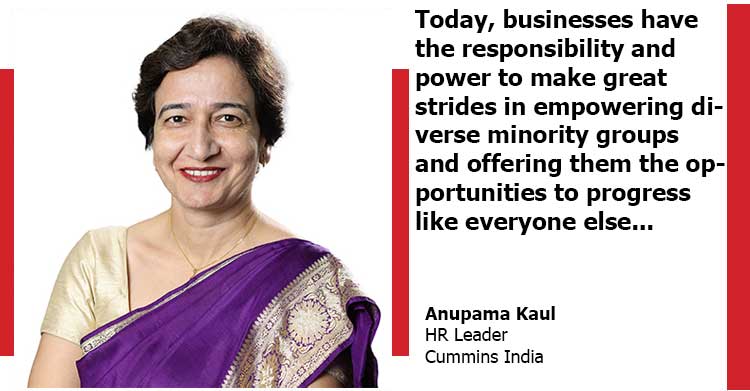HR should look beyond vanilla policies to create an Inclusive Workplace | Anupama Kaul | HR Leader | Cummins India

Today, businesses have the responsibility and power to make great strides in empowering diverse minority groups and offering them the opportunities to progress like everyone else. Among these diverse groups, LGBTQ+ is a community which has faced systematic inequalities in India. In the last few years, awareness about equity and inclusion has gained momentum to create a shift in society, communities, and workplaces. The Human Resources function has a huge opportunity in creating equitable and inclusive workplaces for all diverse groups including LGBTQ+.
The conversations around LGBTQ+ have evolved dramatically over the past decade. India Inc, through robust and effective Diversity, Equity, and Inclusion (DE&I) policies, can help these groups overcome challenges that they face and provide them an inclusive and welcoming environment at work. HR can act as a change catalyst by bringing the discussion of a diverse workforce to the table and help business leaders understand the shifts in workforce and societal trends, and the meaning of ‘being an ally’ to the LGBTQ+ community.
At the very onset, HR professionals need to look at all policy imperatives that are integral to the creation of a safe, harassment free, and inclusive workplace regardless of the sexual orientation. We need to move beyond vanilla policies on respectful treatment, prevention of sexual harassment, and equal employment opportunity policy, and explore concerted efforts to include the voices of business leaders, HR professionals, and most importantly, the LGBTQ+ employees. Inevitably, our employee policies need to be periodically reevaluated to ensure sensitivity towards nonbinary employees. Replacing the word “spouse” with “partner” in benefits policies, having an option in onboarding forms to state “others” in the gender field, covering same sex partner in insurance and adoption leave policies, supporting androgenous dress code policy are some of the easiest ways of showing support and building a welcoming and safe workplace for all employees. Beyond policies, there are practices that can be encouraged like usage of preferred pronouns and advocating allyship. HRs can also spearhead initiatives that aim at ‘making room for everyone to succeed, no matter who they are, where they are, or what they believe’.
While the policies lay the groundwork for attracting diverse talent, with the social construct and pressures, self-identification is not a common practice, which makes active hiring a challenge. While few firms have piloted transgender hiring, finding a qualified pool, and integrating them into the workplace, community, and neighborhood close to their workplaces remain challenging. HR can play a key role by integrating the corporate social responsibility efforts of the firm for creating early engagement programs for transgenders at primary, secondary and higher education levels to take baby steps at solving this concern systemically.
Often, it would be the HR that influences other leaders to be advocates and ambassadors within the organization and enables the setting up of Employee Resource Groups (ERGs). ERGs are the support groups to raise awareness around the community to ensure a welcoming and inclusive environment for our LGBTQ+ colleagues, whether or not they have chosen to self-identify and come out. Once these ERGs are formed and led by the right passionate leaders and allies of the community, HR needs to regularly consult, advise, and empower this group. It is often important for HR to influence a senior leader to be the sponsor or ambassador for the ERG initiatives so that the tone of change is set from the top. Leaders can play an active role in getting the resources they need without bottlenecks. Confronting regressive norms is a continuous process and this is done by the ERGs through periodic seminars, workshops and sensitization programs, and diversity initiatives to promote greater participation, support, and understanding among employees. At Cummins India, we continue to implement new, more comprehensive quarterly DE&I Dashboards for leaders to regularly track and act on critical metrics to move forward representation, development, advancement, and engagement of diverse groups across the company.
HR leaders also play a key role in bringing industry practices into the organization and collaborating with the external ecosystem partners like industry forums, boutique consulting partners, LGBTQ+ specific not-for-profit firms and academic institutions for raising awareness and employability of this underutilized talent pool. Creating a safe, equitable and inclusive workplace for LGBTQ+ employees is not a destination but a journey, and there are a multitude of learnings for all of us as we make progress in this journey. I am confident that by bringing together organization leaders, subject matter experts, and employees, HR doyens will be able to herald a radical change to the workplace of the future.


